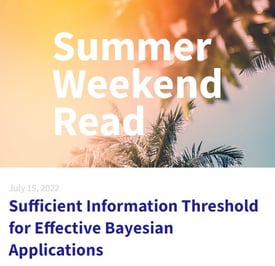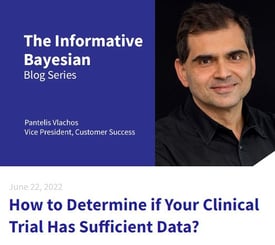The Uses of Bayesian Methods in Late-Phase Clinical Trial Strategy

A number of late-phase clinical trial sponsors remain hesitant to employ Bayesian approaches in confirmatory settings, for fear that such statistical approaches generate obstacles for regulatory acceptance. A new Cytel position paper acknowledges the many strategic uses of Bayesian methods in late-phase trial design, arguing that they help generate more effective, efficient, and ethical clinical trials.
Bayesian methods, with their ability to facilitate flexibility and learning, are often associated with early-phase clinical trials. Their benefits for dose-finding and unplanned stopping in Phase I and II trials are clearly documented. Recently, more Bayesian elements have appeared in some confirmatory trials, particularly those requiring historical borrowing. A 2018 FDA Guidance on the uses of Bayesian methods in medical device trials appeared to normalize the idea that Bayesian methods can and should be used in some confirmatory settings. Pediatric trials, which modify existing adult therapies for younger populations, also benefit from Bayesian approaches.
Without doubt, the idea that Bayesian approaches provide strategic insight for clinical trials is not new. Neyman and Pearson's 1933 paper on hypothesis testing using Bayesian methods has long been the subject of debate, particularly regarding applications within clinical research. Steven Goodman argued in 1999 that several interpretations of statistical results were conflated by the use of p-values, and important distinctions about evidentiary meanings were more easily captured within Bayesian paradigms. Over two decades later, the debate remains unresolved.
Still, a critical element of late-phase regulatory submission requires sponsors to demonstrate Type I error control. In order to do this within a Bayesian clinical trial requires the introduction of Frequentist techniques in a Bayesian paradigm. Expert statisticians well-versed in both Bayesian and Frequentist methods can build a strong regulatory strategy using such an approach, but many sponsors fear the downstream effects if things were to go wrong.
Bayesian statistical approaches also enable sponsors to benefit from a number of quantitative tactics, from using predictive probabilities to estimate the likelihood of early stopping, to the most efficient uses of historical data. They can help quantify the bias of missing data, perform sensitivity analyses, and, with the help of simulations, make critical forecasts during a clinical trial. A number of these approaches can be implemented regardless of whether the clinical trial is designed using Bayesian or Frequentist statistics.
The use of Bayesian statistics should not be confused with the use of Bayesian decision-rules for clinical development strategy. In the case of clinical development strategy, Bayesian approaches offer key insights. Essentially, Bayesian decision-rules allow sponsors to take clinical data and forecast expected utilities of different strategic options, to create a statistical design that optimizes strategic goals. They can be used to select primary endpoints for clinical trials, or to develop Go/No-Go rules in early-phase clinical trials. They can also help sponsors to streamline numerous considerations that can arise during a clinical trial from concerns about cost, time, and sample size, to anxieties about treatment effect.
Given the number of strategic and tactical opportunities offered within a Bayesian paradigm, how can trial sponsors know whether to consider Bayesian approaches? Cytel's new position paper encourages sponsors to begin thinking about clinical trial strategy in terms of whether a given trial design will secure the information sufficient to achieve the clinical trial's goals. Bayesian methods are instrumental to this framework.
Click to learn more:
Read more about Sufficient Information Threshold:
About the Author of the Blog:

Dr. Esha Senchaudhuri is a research and communications specialist, committed to helping scholars and scientists translate their research findings to public and private sector executives. At Cytel Esha leads content strategy and content production across the company's five business units. She received a doctorate from the London School of Economics in philosophy, and is a former early-career policy fellow of the American Academy of Arts and Sciences. She has taught medical ethics at the Harvard School of Public Health (TH Chan School), and sits on the Steering Committee of the Society for Women in Philosophy's Eastern Division, which is responsible for awarding the Distinguished Woman in Philosophy Award.




